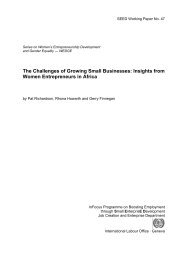manual: women workers' rights and gender equality - International ...
manual: women workers' rights and gender equality - International ...
manual: women workers' rights and gender equality - International ...
Create successful ePaper yourself
Turn your PDF publications into a flip-book with our unique Google optimized e-Paper software.
• When giving training to mixed groups in terms of sex <strong>and</strong> age, take into account that:<br />
- The male/female ratio of representation should range between 40 <strong>and</strong> 60 per cent.<br />
- You should ensure that at least one-third of the participants are <strong>women</strong>, whose <strong>rights</strong> are to<br />
be promoted during the session otherwise it becomes difficult for those in the minority to<br />
effectively have a voice.<br />
- Training on subjects dealing with power abuses <strong>and</strong>/or sexuality is usually best dealt with,<br />
especially in first instance, in <strong>women</strong>- or men-only groups.<br />
• Ensure enough ‘speaking time’ for both sexes but especially <strong>women</strong>. Men will usually be more<br />
used to speaking in public <strong>and</strong> tend to respond faster <strong>and</strong> longer. If this happens, let the<br />
speaker finish, but ask him to be brief. Tell the group that mostly men have taken the floor up<br />
to now <strong>and</strong> that <strong>women</strong>’s perspective <strong>and</strong> views are equally important. Stop giving the floor to<br />
men <strong>and</strong> indicate that <strong>women</strong> are now invited to speak to give ‘equal voice to <strong>women</strong> <strong>and</strong><br />
men’. Ensure that <strong>women</strong>’s perspectives are being heard <strong>and</strong> acknowledge inputs <strong>and</strong><br />
viewpoints of men <strong>and</strong> <strong>women</strong> in starting <strong>and</strong> concluding sessions.<br />
• Promote an informal, cooperative <strong>and</strong> trustful environment throughout the workshop. The<br />
opening session is crucial for setting the right tone. Warm-up exercises <strong>and</strong> icebreakers are<br />
useful for creating a team spirit <strong>and</strong> creating a friendly atmosphere. Ensure respect for all<br />
viewpoints, from men <strong>and</strong> <strong>women</strong>, young <strong>and</strong> old, rich <strong>and</strong> poor <strong>and</strong> people with different<br />
ethnicities <strong>and</strong> cultural backgrounds. Discourage judgmental <strong>and</strong> condescending comments<br />
among participants. When a friendly environment is created, participants are more likely to<br />
voice their honest opinions, fears, ‘obstacles’, <strong>and</strong> needs. If participants’ true concerns <strong>and</strong><br />
needs are not addressed, discussions will be less relevant, <strong>and</strong> consequently the learning will<br />
be less effective.<br />
• Respect local wisdom from <strong>women</strong> <strong>and</strong> men of all ages, income classes <strong>and</strong> ethnicities. Use<br />
the knowledge people have as an entry point <strong>and</strong> respect points of view that are not your own.<br />
People with little education may know a lot <strong>and</strong> be very smart.<br />
• Avoid creating a divide between men <strong>and</strong> <strong>women</strong>. Stereotyping all <strong>women</strong> as the victims <strong>and</strong><br />
all men as the aggressors is misleading <strong>and</strong> can be very threatening. Resist making sweeping<br />
generalizations. Draw out the ‘<strong>women</strong>’s perspective’ <strong>and</strong> respect the ‘men’s perspective’.<br />
• Encourage inputs from all participants, <strong>and</strong> be receptive to suggestions for improvement. All<br />
trainers <strong>and</strong> facilitators must stick to the aims of the training <strong>and</strong> timetable, but at the same<br />
time be flexible in running their session, in terms of the content <strong>and</strong> the process (timing <strong>and</strong><br />
methodology). Adults learn best when in control of their own learning process.<br />
• If men or ‘elite <strong>women</strong>’ feel threatened by the subject under discussion they may start to make<br />
sexist jokes, use derogatory language towards <strong>women</strong>, or make other comments to keep<br />
<strong>women</strong> ‘in their place’. If <strong>women</strong> are not secure or feel safe in the situation, they will accept<br />
this. Address this type of behaviour immediately by asking the persons in question whether<br />
they really believe what they say <strong>and</strong> why they believe this. Ask other participants whether they<br />
agree or not <strong>and</strong> start a dialogue on the subject. Usually, this works out fine, because people<br />
generally have no doubt when there is no respect for one another <strong>and</strong> basic <strong>rights</strong> are being<br />
violated. If obnoxious behaviour persists, cut the person short <strong>and</strong> indicate that un-respectful<br />
behaviour is not tolerated in the group.<br />
• It helps to have the support from high-level people for <strong>gender</strong> <strong>equality</strong> activities, whether it is<br />
within your organization, from a local chief or other respected <strong>women</strong> <strong>and</strong> men in the<br />
workplace or community. People are willing to think about the subject if they underst<strong>and</strong> that<br />
respectable persons give their support to the issue.<br />
10

















